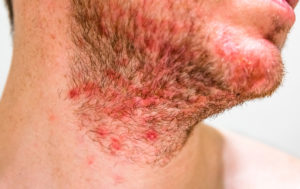Seborrheic Dermatitis Treatment
 Seborrheic Dermatitis Treatment – Guardian featured Harley Street IBS, Autoimmune & Skin Clinic addresses the underlying issues, not just the symptoms in our seborrheic dermatitis treatment.
Seborrheic Dermatitis Treatment – Guardian featured Harley Street IBS, Autoimmune & Skin Clinic addresses the underlying issues, not just the symptoms in our seborrheic dermatitis treatment.
What is seborrheic dermatitis?
Seborrheic dermatitis is a common, chronic or relapsing form of eczema/dermatitis that mainly affects the sebaceous glands – regions of the scalp, face, and trunk.
There are infantile and adult forms of seborrheic dermatitis and it is sometimes associated with psoriasis (sebopsoriasis). Seborrheic dermatitis is also known as seborrheic eczema.
Dandruff is an uninflamed form of seborrhoeic dermatitis. Dandruff presents as scaly, flaky patches on the scalp.
What causes seborrheic dermatitis?
The cause of seborrheic dermatitis is not completely understood by orthodox medicine. It is associated with proliferation of various species of the skin commensal Malassezia, in its yeast form. Its metabolites (such as the fatty acids oleic acid, malssezin, and indole-3-carbaldehyde) may cause an inflammatory reaction. Differences in skin barrier lipid content and function may account for individual presentations.
Who gets seborrheic dermatitis?
Infantile seborrheic dermatitis affects babies of less than 3 months of age and usually resolves by the time they are 6–12 months old.
Adult seborrheic dermatitis tends to begin in the late teens. Prevalence is greatest in young adults and in seniors. It is more common in males than in females.
The following factors are sometimes associated with severe adult seborrheic dermatitis:
- Oily skin
- Familial tendency to seborrheic dermatitis or a family history of psoriasis
- Immunosuppression: organ transplant recipient, HIV infection and patients with lymphoma
- Neurological and psychiatric diseases: Parkinson’s disease, depression, epilepsy, facial nerve palsy, spinal cord injury and congenital disorders such as Down syndrome.
What are the clinical features of seborrheic dermatitis?
In babies
- Infantile seborrheic dermatitis causes cradle cap (greasy scaling on scalp). The rash may spread to affect armpit and groin folds (a type of nappy rash)
- There are pink patches that may flake or peel
- It is not very itchy so the baby often appears undisturbed by the rash
In adults
Seborrheic dermatitis affects scalp, face, around the nose, behind ears, within eyebrows and upper trunk.
Typical features include:
- Winter flares, improving in summer
- Minimal itch most of the time
- Combination oily and dry mid-facial skin
- Scaly patches on the scalp
- Blepharitis – scaly red eyelid edges
- Pink, scaly plaques in skin folds each side of the face
- Ring shaped flaky patches on hair-line and chest
- Rash in armpits, under the breasts, in the groin folds, and genital creases
- Folliculitis (inflamed hair follicles) on cheeks and upper trunk
What is the orthodox treatment for seborrheic dermatitis?
Treatment of seborrheic dermatitis often involves several of the following options:
- Keratolytics can be used to remove scale when necessary, e.g. salicylic acid, lactic acid, urea, propylene glycol
- Topical antifungal agents are applied to reduce malassezia eg ketoconazole, or ciclopirox shampoo and/or cream. Note, some strains of malassezia are resistant to azole antifungals
- Mild topical corticosteroids are prescribed for 1–3 weeks to reduce the inflammation of an acute flare
In resistant cases in adults, oral antibiotics may be recommended.
Causes
Like many conditions, the etiology of eczema is multifactorial. However, we have seen many patients achieve complete resolution with the proper diet, lifestyle, natural medicine and supplemental support.
Natural Seborrheic Dermatitis Treatment
During treatment we will consider:
- Many patients with this condition have underlying food intolerances and therefore can benefit greatly from food intolerance testing
- Nourish the body with nutrients that support skin health and optimal immune function, whether in food or supplemental form
- Support gut health
- Address toxicity
- Emphasise stress management
- Recommend strict avoidance of detergents and other topical irritants that can cause skin barrier permeability and exacerbate inflammation
A 28 year old female presenting with lifelong, severe seborrheic dermatitis. She had been given steroids to try to manage it:
“I sought Deborah’s expertise after my husband stumbled across the website four months ago. At that point, I honestly felt and was told by doctors that I could be living with my severe seborrheic dermatitis for life. In my first consultation she confidently mentioned that she was sure I could recover. Four months on, my skin has nearly completely healed. I no longer have sleepless nights, endless itchiness, raw skin and puffy eyes.
I can’t believe we have gone so far in my treatment in such a short span of time. Deborah really believes it is team work between myself and her. Deborah effectively uses a variety of tests to inform me about my health to provide the right plan of care for my personal health issues.”
Saffiyah – London
Our seborrheic dermatitis treatment approaches the patient as a whole being and not just their skin. We do not have a one size fits all approach – everything is tailored to meet each patient’s unique needs.
We also address the gut issues, which are often associated with this condition.
References
Topical anti-inflammatory agents for seborrhoeic dermatitis of the face or scalp.
If you would like to book an appointment
Contact Deborah’s Medical Secretary for an appointment